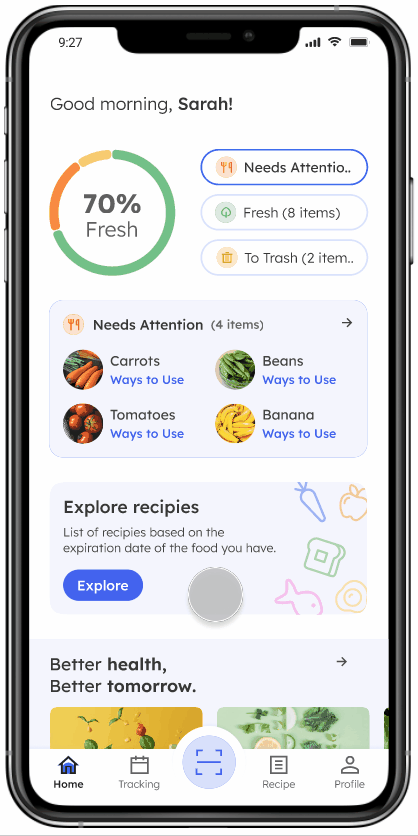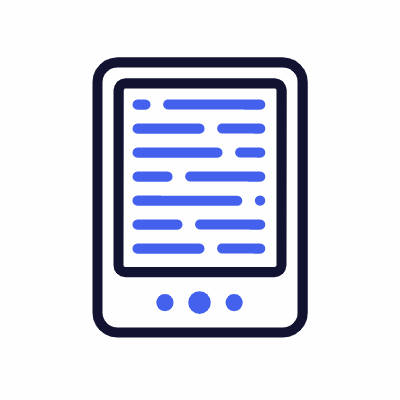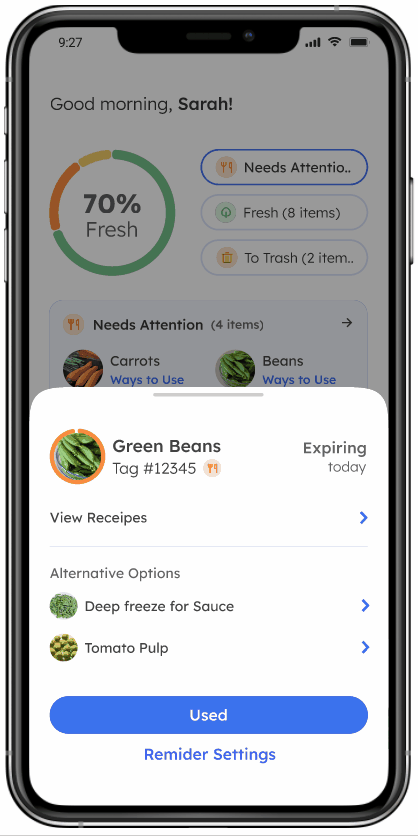
SensiFi
Managing food inventory at home through
smart tag + mobile app
Date
Aug 2022 - Oct 2022
Team
2 UX Designers,
2 UX Researchers
My Role
User Research, Content Design, Storyboarding, Personas
Wireframing, Prototyping, High-fi visual designs, User Testing
Tools
Figma, FigJam,
Illustrator, Zoom,
Miro, Google Forms,
Office 365, pen & paper
Problem
Food waste is a significant global issue, with much of it from unused/expired goods. It causes billions in financial losses and accelerates environmental problems like global warming. In developed countries, the most significant contributor to food waste is at the household level. Problem arises due to improper planning, busy schedules, excessive buying behavior, or forgetfulness.
Solution
The solution is a mobile app + a sensor to help users track and monitor their food inventory at home with minimal user intervention. The app can track the data of any particular food item via the sensor attached, analyze its expiry date and condition later then provide alerts to users, and recommend recipes based on the expiry date tracking system.

Design Process
Following a Design Process ensured that the end result was user-centered, met project goals, and led to better collaboration and more efficient decision-making.






* click on sections to jump to them
How might we help people to manage their food inventory at home and thereby reduce food wastage at home?
Research
A comprehensive literature review was conducted to gain an in-depth understanding of the impacts of food waste on various aspects of the world. The objective of the review was to examine the reasons for its occurrence, identify areas where it is prevalent, and evaluate the current solutions available in the market.
Findings are:
But, where is the REAL problem?
It is our Home.
Observations & Interviews
A survey was conducted to acquire a thorough comprehension of the end-users, their level of awareness, shopping behaviors, storage routines, and wastage patterns. The survey was posted in college groups, food-related Reddit accounts, etc. The results of the survey offered valuable quantitative information on the subject matter. The results also showed that food waste is not restricted to a particular demographic, but affects individuals of all ages.





Getting on the Ground
Extensive research was carried out to gather insights into the food inventory management practices of individuals and involved conducting user interviews with 8 participants of diverse age and occupational backgrounds to comprehend their perspectives. Additionally, on-site observations were performed at both residential and grocery locations to observe their storage and purchasing habits and support the information obtained from the interviews.

*field drawings

*field photo

*field drawings
Defining the Problem
Affinity mapping was used to group similar ideas and observations together and identify common themes that emerged from the data. This facilitated a deeper understanding of the food waste problem and helped to identify potential opportunities for design solutions.

Defining our Personas
Analogous to Bartle's Taxonomy of player types, I categorized my users into movie/film terminology.
hero~ knows environmental impact & taking active measures
supporting role~ knows environmental impact but unable to take measures
body double~ doesn't know environmental impact but is taking measures
villain~ doesn't know environmental impact & not taking measures
This Mapping exercise & heat mapping of our persona types provided valuable insights that were utilized to define our archetypes.

Ideating
We conducted 3 different brainstorming sessions over a week. Each session was different in terms of the variety, uniqueness, and wildness of the ideas. The 3 design directions we considered which also went hand in hand with the 3Rs of sustainability were:
1. “How might we help users to manage food inventory and reduce food waste at home?
2. “How might we help the users to effectively reuse the leftover food at home?
3. “How might we help the users to recycle food waste at home in order to help the environment?
We let our ideas RUN WILD
-
A hologram projection on the refrigerator to reduce space
-
Container with a QR code that can be linked to the mobile
-
Helpful articles on how to grocery shop
-
Suggest innovative ways to utilize leftovers
-
Statistical data to show how much food they saved
-
Donation app connecting citizens
-
A smartwatch app to remind users to create a shopping list
-
Suggest a recipe for the food in the fridge
-
A smart refrigerator
-
Reminder or notification that the food needs your attention
-
Active Packaging can extend the shelf-life of the food
-
Reward system on throwing away less food


Storyboarding
For the design direction, we considered two use cases, each for one behavioral persona/archetype. The two personas are:
1. Amanda, an aware user but not taking any initiative ~ (persona type: supporting role)
2. Jake, an unaware user ~ (persona type: villain)

*Amanda

*Jake
Now, let's talk about the IDEA
During the process of oxidation, every food item releases gaseous byproducts which are capable of being detected by chemical sensors. This information can then be utilized and fed to our app to predict the expiration date of the food item through the utilization of near-field communication technology.
- The proposed app will notify users about the items in their refrigerator, and about the expiration dates of the food inside so that they may cook it and prevent it from being thrown out and can also suggest how to effectively utilize all the expiring items.

Wireframes
Upon finalization of the concept and design layout, a comprehensive examination of multiple variations of the idea was conducted, ultimately leading to the integration of the most optimal elements to form the completed wireframes.

Usability Testing
Heuristic Evaluation
We performed a heuristic evaluation using Nielsen's heuristics to assess and examine the effectiveness of the product,
The findings from the evaluation were:
Heuristic: Match between system and the real world
Certain elements of the application's writing and labeling i.e UX Copy caused confusion among users. Specifically, items that already exceeded their expiration date were marked as having "00 days remaining," leading to misunderstandings.

Heuristic: User control and freedom, Error Prevention
It was noted during the heuristic evaluation that there was a lack of functionality to reverse or undo the action of removal of items from the tracking list

Think-Aloud Sessions
A think-aloud study was carried out on the application with 8 participants. The participants were asked to perform 4 designated tasks, which were as follows:
-
Connecting a food item with a tag.
-
Monitoring the food item that was added.
-
Determining utilization of food items through recipes.
-
Deleting the food item.
The findings from the evaluation were:
"But I have a tag and a food item, how should I proceed?"
"This way of deleting food item is very hard and takes much time to figure it out"
"Does 0 days mean, it's expiring today?"
TADAA! Here is the final App Design
Drum Rolls!

Attach food item to a designated tag. This will allow to continuously monitor the status of all tracked food items and receive prompt updates regarding their condition

Obtain a concise overview of the freshness status of the tracked food items, accompanied by guidance on their optimal utilization

Access customized recipes based on the specific requirements, expiry dates and food items in possession of the user
Product Demo Video: https://youtu.be/olBIp_PVOGE
Learnings & Reflections
Team
Learned the importance of
embracing our differences and building a team dynamic filled with trust, open communication, and giggles
The User
Learned to keep our biases aside (it is difficult), and concentrate wholly on user needs and feedback constantly keeping them at the center of all thoughts
Personal
Learned some really cool Figma tricks, how to build a good case study, how to research from the ground up, and the ethics of research. Improved on how to design content appropriately
My wonderful TEAM

(L-R)
me,
Riya Marium Thomas,
Nisarg Rajpura,
Radhika Bhoj